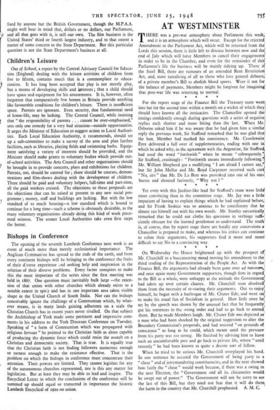AT WESTMINSTER
THERE was a pre-war atmosphere about Parliament this week; and it is an atmosphere which will recur. Except for the rejected Amendment to the Parliament Act, which will be returned from the! Lords this session, there is little left to discuss between now and the end of July which will force Members to cancel their engagements in order to be in the Chamber, and even for the remainder of this Parliament's life the business will be mainly tidying up. There i4 the Steel Bill, there are rumours of an amended Rent Restriction Act, and, most tantalising of all to those who love general debates) of a private member's Bill to abolish blood sports. Were it not for the balance of payments, Members might be forgiven for imagining] that post-war life was returning to normal.
For the report stage of the Finance Bill the Treasury team went into bat for the second time within a month on a wicket of which they should have known all the intricacies. The Chancellor opened the innings confidently enough during questions with a series of negative replies each shorter and more biting than the last. When Mr. Osborne asked him if he was aware that he had given him a similar reply the previous week, Sir Stafford remarked that he was glad that the hon. Member had marked his consistency. Mr. Crosthwaite Eyre delivered a full over of supplementaries, ending with one in which he asked why, in the agreement with the Argentine, Sir Stafford had used the word " forthwith " when he meant " subsequently." Sir Stafford, crushingly : " Forthwith means immediately following.'3 Mr. William Shepherd got a mollifying " I am afraid I cannot say, but Sir John Mellor and Mr. Boyd Carpenter received such curt " No, sirs " that Mr. De La Bere was provoked into one of his out-I, bursts and shouted furiously, " Why not ? "
* * * *
Yet even with this Jardine-like lead Sir Stafford's team were littld more convincing than in the committee stage. Mr. Jay was a little' impatient of having to explain things which he had explained before,' and Sir Frank Soskice was so anxious to be conciliatory that he almost ran himself out with his own words. Mr. Stanley sarcastically remarked that he could not clothe his questions in verbiage suffi.J ciently obscure for the learned gentleman to understand. The truth' is, of course, that by report stage there are hardly any concessions a' Chancellor is prepared to make, and whereas his critics can continue to refine their arguments, his supporters find it more and morel difficult to say No in a convincing way.
On Wednesday the House brightened up with the prospect of Mr. Churchill in a buccaneering mood moving his amendment to the third reading of the Representation of the People Act. As with the Finance Bill, the arguments had already been gone over ad nauseam, and once again many Government supporters, though firm in regard to the Bill as a whole, were unhappy at the attitude the Government had taken up over certain clauses. Mr. Churchill soon absolved them from the necessity of re-stating their arguments. Out to enjoy himself, he began with a burlesque of Mr. Chuter Ede, and went on to make his usual fun of Socialism in general. How little store he set by the speech was shown by the unusual fact that he frequently got his sentences in the wrong order and had to go back to amend them. But he made Members laugh. Mr. Chuter Ede was depicted as a man who had been shocked by the original suggestion to alter the Boundary Commission's proposals, and had resisted " on grounds of, conscience " as long as he could, which meant until the pressure from his party was too strong. He finished by advising him to leave such an uncomfortable post and go back to private life, where " until recently " he had been known as quite a decent sort of fellow.
When he tried to be serious Mr. Churchill overplayed his hand. In one sentence he accused the Government of being party to a " cheat " and of jerrymandering constituencies, and in the next showed how fairly the " cheat " would work because, if there was a swing in the next Election, the " Government and all its chicaneries would be swept out of power." The Government will not be sorry to see the last of this Bill, but they need not fear that it will do themi the harm in the country that Mr. Churchill prophesied. A. M. C.






























 Previous page
Previous page